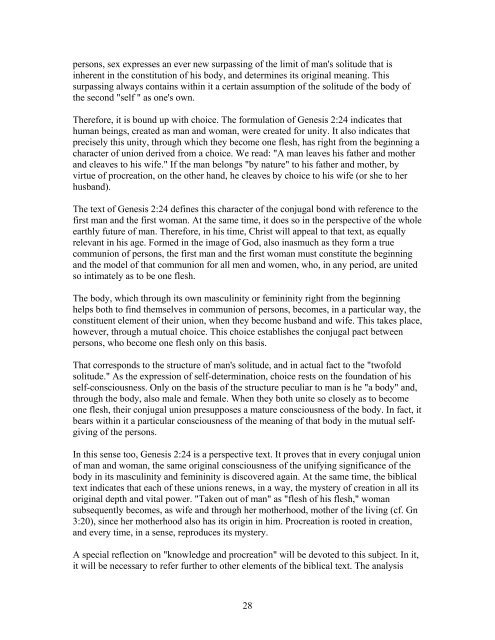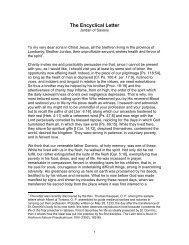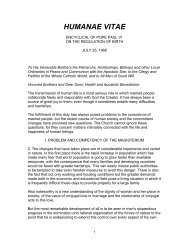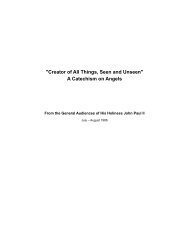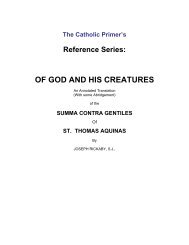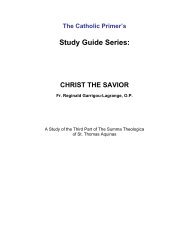The Theology of the Body by John Paul II - The Catholic Primer
The Theology of the Body by John Paul II - The Catholic Primer
The Theology of the Body by John Paul II - The Catholic Primer
You also want an ePaper? Increase the reach of your titles
YUMPU automatically turns print PDFs into web optimized ePapers that Google loves.
persons, sex expresses an ever new surpassing <strong>of</strong> <strong>the</strong> limit <strong>of</strong> man's solitude that is<br />
inherent in <strong>the</strong> constitution <strong>of</strong> his body, and determines its original meaning. This<br />
surpassing always contains within it a certain assumption <strong>of</strong> <strong>the</strong> solitude <strong>of</strong> <strong>the</strong> body <strong>of</strong><br />
<strong>the</strong> second "self " as one's own.<br />
<strong>The</strong>refore, it is bound up with choice. <strong>The</strong> formulation <strong>of</strong> Genesis 2:24 indicates that<br />
human beings, created as man and woman, were created for unity. It also indicates that<br />
precisely this unity, through which <strong>the</strong>y become one flesh, has right from <strong>the</strong> beginning a<br />
character <strong>of</strong> union derived from a choice. We read: "A man leaves his fa<strong>the</strong>r and mo<strong>the</strong>r<br />
and cleaves to his wife." If <strong>the</strong> man belongs "<strong>by</strong> nature" to his fa<strong>the</strong>r and mo<strong>the</strong>r, <strong>by</strong><br />
virtue <strong>of</strong> procreation, on <strong>the</strong> o<strong>the</strong>r hand, he cleaves <strong>by</strong> choice to his wife (or she to her<br />
husband).<br />
<strong>The</strong> text <strong>of</strong> Genesis 2:24 defines this character <strong>of</strong> <strong>the</strong> conjugal bond with reference to <strong>the</strong><br />
first man and <strong>the</strong> first woman. At <strong>the</strong> same time, it does so in <strong>the</strong> perspective <strong>of</strong> <strong>the</strong> whole<br />
earthly future <strong>of</strong> man. <strong>The</strong>refore, in his time, Christ will appeal to that text, as equally<br />
relevant in his age. Formed in <strong>the</strong> image <strong>of</strong> God, also inasmuch as <strong>the</strong>y form a true<br />
communion <strong>of</strong> persons, <strong>the</strong> first man and <strong>the</strong> first woman must constitute <strong>the</strong> beginning<br />
and <strong>the</strong> model <strong>of</strong> that communion for all men and women, who, in any period, are united<br />
so intimately as to be one flesh.<br />
<strong>The</strong> body, which through its own masculinity or femininity right from <strong>the</strong> beginning<br />
helps both to find <strong>the</strong>mselves in communion <strong>of</strong> persons, becomes, in a particular way, <strong>the</strong><br />
constituent element <strong>of</strong> <strong>the</strong>ir union, when <strong>the</strong>y become husband and wife. This takes place,<br />
however, through a mutual choice. This choice establishes <strong>the</strong> conjugal pact between<br />
persons, who become one flesh only on this basis.<br />
That corresponds to <strong>the</strong> structure <strong>of</strong> man's solitude, and in actual fact to <strong>the</strong> "tw<strong>of</strong>old<br />
solitude." As <strong>the</strong> expression <strong>of</strong> self-determination, choice rests on <strong>the</strong> foundation <strong>of</strong> his<br />
self-consciousness. Only on <strong>the</strong> basis <strong>of</strong> <strong>the</strong> structure peculiar to man is he "a body" and,<br />
through <strong>the</strong> body, also male and female. When <strong>the</strong>y both unite so closely as to become<br />
one flesh, <strong>the</strong>ir conjugal union presupposes a mature consciousness <strong>of</strong> <strong>the</strong> body. In fact, it<br />
bears within it a particular consciousness <strong>of</strong> <strong>the</strong> meaning <strong>of</strong> that body in <strong>the</strong> mutual selfgiving<br />
<strong>of</strong> <strong>the</strong> persons.<br />
In this sense too, Genesis 2:24 is a perspective text. It proves that in every conjugal union<br />
<strong>of</strong> man and woman, <strong>the</strong> same original consciousness <strong>of</strong> <strong>the</strong> unifying significance <strong>of</strong> <strong>the</strong><br />
body in its masculinity and femininity is discovered again. At <strong>the</strong> same time, <strong>the</strong> biblical<br />
text indicates that each <strong>of</strong> <strong>the</strong>se unions renews, in a way, <strong>the</strong> mystery <strong>of</strong> creation in all its<br />
original depth and vital power. "Taken out <strong>of</strong> man" as "flesh <strong>of</strong> his flesh," woman<br />
subsequently becomes, as wife and through her mo<strong>the</strong>rhood, mo<strong>the</strong>r <strong>of</strong> <strong>the</strong> living (cf. Gn<br />
3:20), since her mo<strong>the</strong>rhood also has its origin in him. Procreation is rooted in creation,<br />
and every time, in a sense, reproduces its mystery.<br />
A special reflection on "knowledge and procreation" will be devoted to this subject. In it,<br />
it will be necessary to refer fur<strong>the</strong>r to o<strong>the</strong>r elements <strong>of</strong> <strong>the</strong> biblical text. <strong>The</strong> analysis<br />
28


